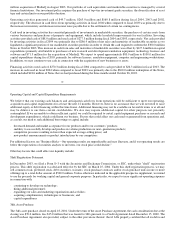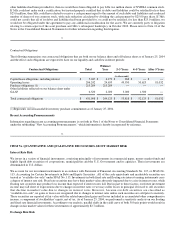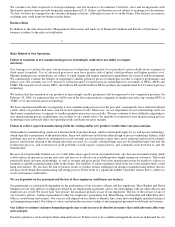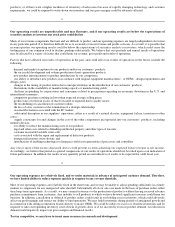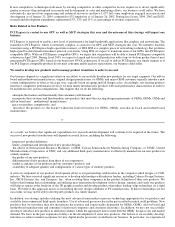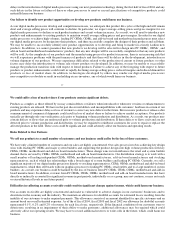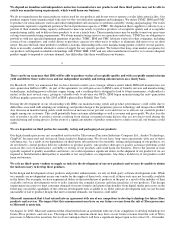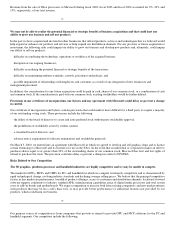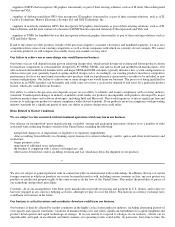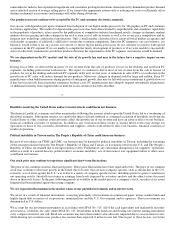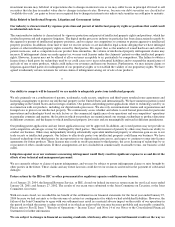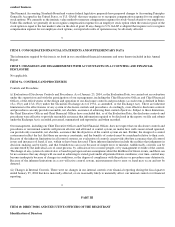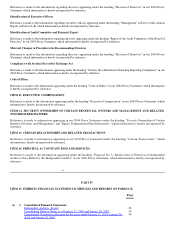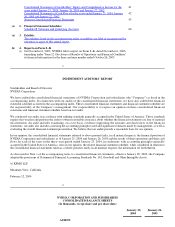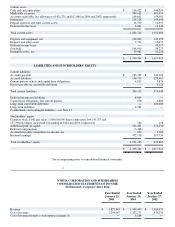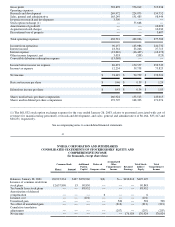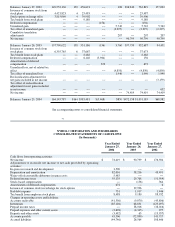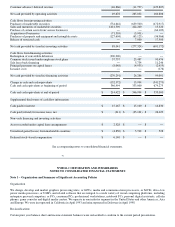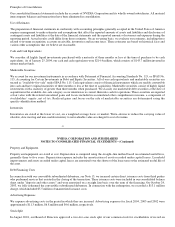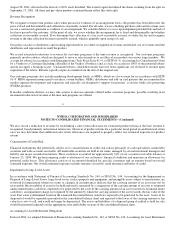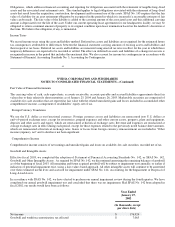NVIDIA 2004 Annual Report Download - page 31
Download and view the complete annual report
Please find page 31 of the 2004 NVIDIA annual report below. You can navigate through the pages in the report by either clicking on the pages listed below, or by using the keyword search tool below to find specific information within the annual report.
investment income may fall short of expectations due to changes in interest rates or we may suffer losses in principal if forced to sell
securities that decline in market value due to changes in interest rates. However, because our debt securities are classified as
"available−for−sale", no gains or losses are recognized due to changes in interest rates unless such securities are sold prior to maturity.
Risks Related to Intellectual Property, Litigation and Government Action
Our industry is characterized by vigorous protection and pursuit of intellectual property rights or positions that could result
in substantial costs to us.
The semiconductor industry is characterized by vigorous protection and pursuit of intellectual property rights and positions, which has
resulted in protracted and expensive litigation. The digital media processor industry in particular has been characterized recently by
the aggressive pursuit of intellectual property positions, and we expect our competitors to continue to pursue aggressive intellectual
property positions. In addition, from time to time we receive notices or are included in legal actions alleging that we have infringed
patents or other intellectual property rights owned by third parties. We expect that, as the number of issued hardware and software
patents increases, and as competition in our product lines intensifies, the volume of intellectual property infringement claims may
increase. If infringement claims are made against us, we may seek licenses under the claimants’ patents or other intellectual property
rights. However, licenses may not be offered at all or on terms acceptable to us, particularly by competitors. The failure to obtain a
license from a third party for technology used by us could cause us to incur substantial liabilities and to suspend the manufacture of
and sale of one or more products, which could reduce our revenues and harm our business. Furthermore, we may initiate claims or
litigation against third parties for infringement of our proprietary rights or to establish the validity of our proprietary rights. We have
agreed to indemnify certain customers for certain claims of infringement arising out of sale of our products.
33
Our ability to compete will be harmed if we are unable to adequately protect our intellectual property.
We rely primarily on a combination of patents, trademarks, trade secrets, employee and third−party nondisclosure agreements and
licensing arrangements to protect our intellectual property in the United States and internationally. We have numerous patents issued
and pending in the United States and in foreign countries. Our patents and pending patent applications relate to technology used by us
in connection with our products, including our digital media processors. We also rely on international treaties and organizations and
foreign laws to protect our intellectual property. We continuously assess whether and where to seek formal protection for particular
innovations and technologies based on such factors as: the commercial significance of our operations and our competitors’ operations
in particular countries and regions; the location in which our products are manufactured; our strategic technology or product directions
in different countries; and the degree to which intellectual property laws exist and are meaningfully enforced in different jurisdictions.
Our pending patent applications and any future applications may not be approved. In addition, any issued patents may not provide us
with competitive advantages or may be challenged by third parties. The enforcement of patents by others may harm our ability to
conduct our business. Others may independently develop substantially equivalent intellectual property or otherwise gain access to our
trade secrets or intellectual property. Our failure to effectively protect our intellectual property could harm our business. We have
licensed technology from third parties for incorporation in our digital media processors, and expect to continue to enter into license
agreements for future products. These licenses may result in royalty payments to third parties, the cross licensing of technology by us
or payment of other consideration. If these arrangements are not concluded on commercially reasonable terms, our business could
suffer.
Litigation against us or our customers concerning infringement would likely result in significant expense to us and divert the
efforts of our technical and management personnel.
We are currently subject to claims of patent infringement, and we may be subject to patent infringement claims or suits brought by
other parties in the future. These claims and any future lawsuits could divert our resources and result in the payment of substantial
damages.
Future actions by the IRS or SEC or other governmental or regulatory agencies could harm our business.
As of January 25, 2004, the Internal Revenue Service, or IRS, closed our federal income tax return exam for our fiscal years ended
January 28, 2001 and January 27, 2002. The results of our exam were submitted to the Joint Committee on Taxation, or the Joint
Committee, for review.
With our exam closed, we recorded the tax benefit of the settlement in our financial statements for the fiscal year ended January 25,
2004 because we had certainty as to the outcome of certain tax contingencies for which we had established liabilities. However, the
failure of the Joint Committee to agree with our settlement may result in a material adverse impact on the results of our operations in
the period in which the matter is either resolved or in which an unfavorable outcome becomes probable and reasonably estimable.
Please refer to Part II, Item 7 "Results of Operations − Income Taxes" and Note 14 of our Notes to the Consolidated Financial
Statements for further information.
We are subject to changes in financial accounting standards, which may affect our reported financial results or the way we


